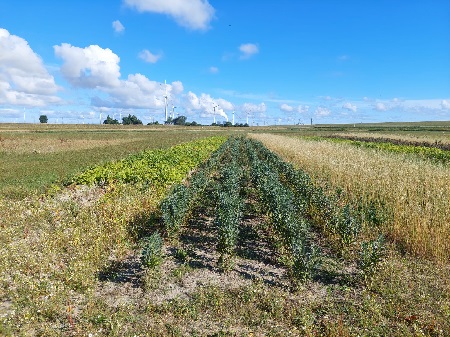Dutch organizations combine knowledge about controlling salinization in deltas in a new Institute
Due to climate change, sea level rise and subsidence, the salinization of the inland dike lands along the Dutch coast, but also in other deltas, is gradually increasing. As a result, the available amount of freshwater decreases. Salinization also makes ground and surface water less suitable for many users. Salinization leads to damage to agricultural crops and threatens food production. Three knowledge institutes and three universities of applied sciences are therefore joining forces and joining forces in the Institute for Agriculture in Salinizing Deltas with the aim of learning to use the available freshwater sparingly and smartly and to make our agricultural system salinization-proof.
Thanks to its combination of applied water, soil and crop knowledge, the initiative is unique in the Netherlands and internationally relevant. Deltas in the world face the same threats and consist predominantly of clay-rich soils. Clay is very sensitive to salinization. Once degraded soil has a poor structure, is less fertile and that will lead to lower yields and ultimately a lower income of the farmer. The increasing salinization of ground and surface water reduces the availability of water for agriculture and many other functions and requires timely, robust, and sustainable solutions.

Practical knowledge
The emphasis of the Institute is on limiting the impact of salinization as much as possible on the basis of thorough system understanding and practical knowledge (water, soil and crops). In addition, possibilities for adapting crops to more salty conditions are considered. The application is accelerated by working together in a Living Lab to develop and evaluate effective measures in the cultivation systems and in local and regional water management.
By bringing together the knowledge from various coastal regions in the Netherlands, and through the use of leading and internationally working knowledge partners, the Institute has crucial building blocks for tackling the issue of increasing salinization and availability of freshwater. The partners will work with governments and the business community on a National Knowledge Agenda on Salinization. The knowledge cluster promotes coherence and collaboration in research and projects. As the initiator, the province of Fryslân has made the start possible.

Partners
The substantive work of the Institute is made possible by its 'founding partners' who make manpower available for a flying start. These are University of Groningen, Deltares, Wageningen University & Research, Van Hall Larenstein University of Applied Sciences, Hanze University of Applied Sciences and HZ University of Applied Sciences. The Institute invites interested parties to become partners and actively participate in future projects, knowledge sharing and the development of the knowledge agenda.
The Institute will be located at the WaterCampus in Leeuwarden, the Netherlands.
More news
-
13 January 2026
New framework verifies AI-generated chatbot answers
